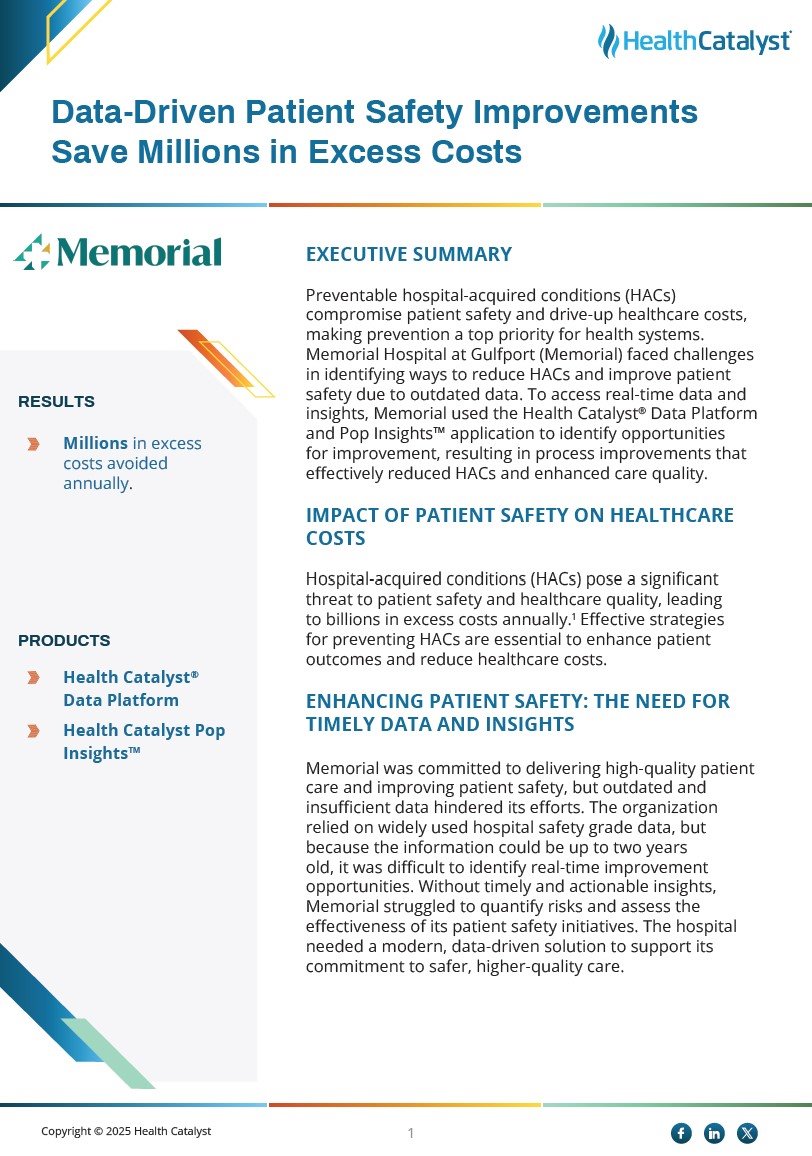Preventable hospital-acquired conditions (HACs) compromise patient safety and drive-up healthcare costs, making prevention a top priority for health systems. Memorial Hospital at Gulfport (Memorial) faced challenges in identifying ways to reduce HACs and improve patient safety due to outdated data. To access real-time data and insights, Memorial used the Health Catalyst® Data Platform and Pop Insights™ application to identify opportunities for improvement, resulting in process improvements that effectively reduced HACs and enhanced care quality.
Hospital-acquired conditions (HACs) pose a significant threat to patient safety and healthcare quality, leading to billions in excess costs annually.1 Effective strategies for preventing HACs are essential to enhance patient outcomes and reduce healthcare costs.
Memorial was committed to delivering high-quality patient care and improving patient safety, but outdated and insufficient data hindered its efforts. The organization relied on widely used hospital safety grade data, but because the information could be up to two years old, it was difficult to identify real-time improvement opportunities. Without timely and actionable insights, Memorial struggled to quantify risks and assess the effectiveness of its patient safety initiatives. The hospital needed a modern, data-driven solution to support its commitment to safer, higher-quality care.
Memorial used the Health Catalyst® Data Platform to address these challenges and gain real-time insight into patient safety indicator performance. The platform enabled the organization to visualize performance, automate key calculations, and identify critical improvement opportunities while also determining the organization’s patient safety “grade.”
Memorial uses the Health Catalyst Pop Insights™ application to calculate and visualize patient safety indicator performance automatically, generating performance insights. The application provides a self-service solution that empowers users to visualize, monitor, share, quantify, and report performance. Armed with this technology, Memorial’s improvement teams drilled into detailed, high-quality data to understand performance trends, identify root causes, and prioritize improvement activities.
Memorial identified numerous opportunities to enhance practices to prevent HACs, implementing process changes to improve performance and patient safety. Opportunities and process changes included:
Memorial uses the analytics application to monitor performance and provide clinical teams feedback, ensuring adherence to standard processes.
Memorial’s data-driven improvements have enhanced care quality and patient safety. By using real-time insights and targeted interventions, the organization has achieved the following results:
“The insights generated from the analytics platform enabled us to transform patient safety, ensuring every patient receives the highest standard of care while reducing hospital-acquired conditions.”
- Darlene Howard, Data Scientist, Memorial Hospital at Gulfport
Memorial is committed to building upon its patient safety improvements and plans to continue to advance initiatives supporting patient safety and the well-being of every person entrusted to its care.


